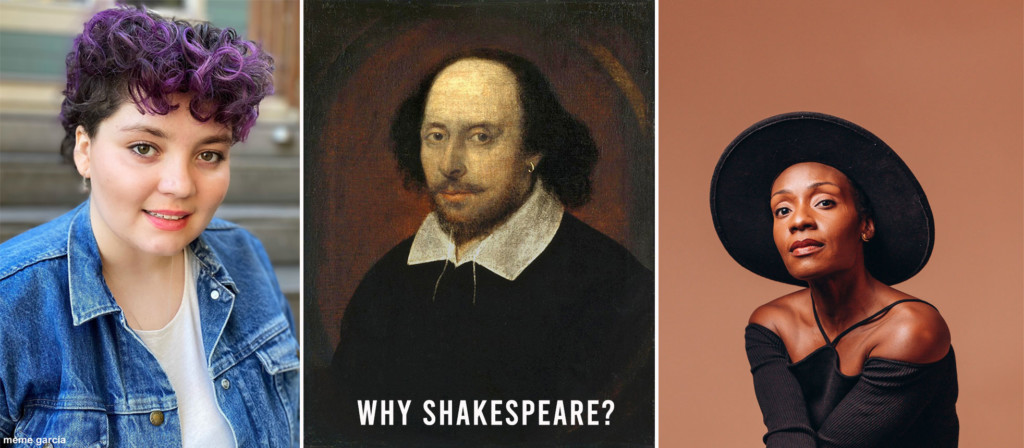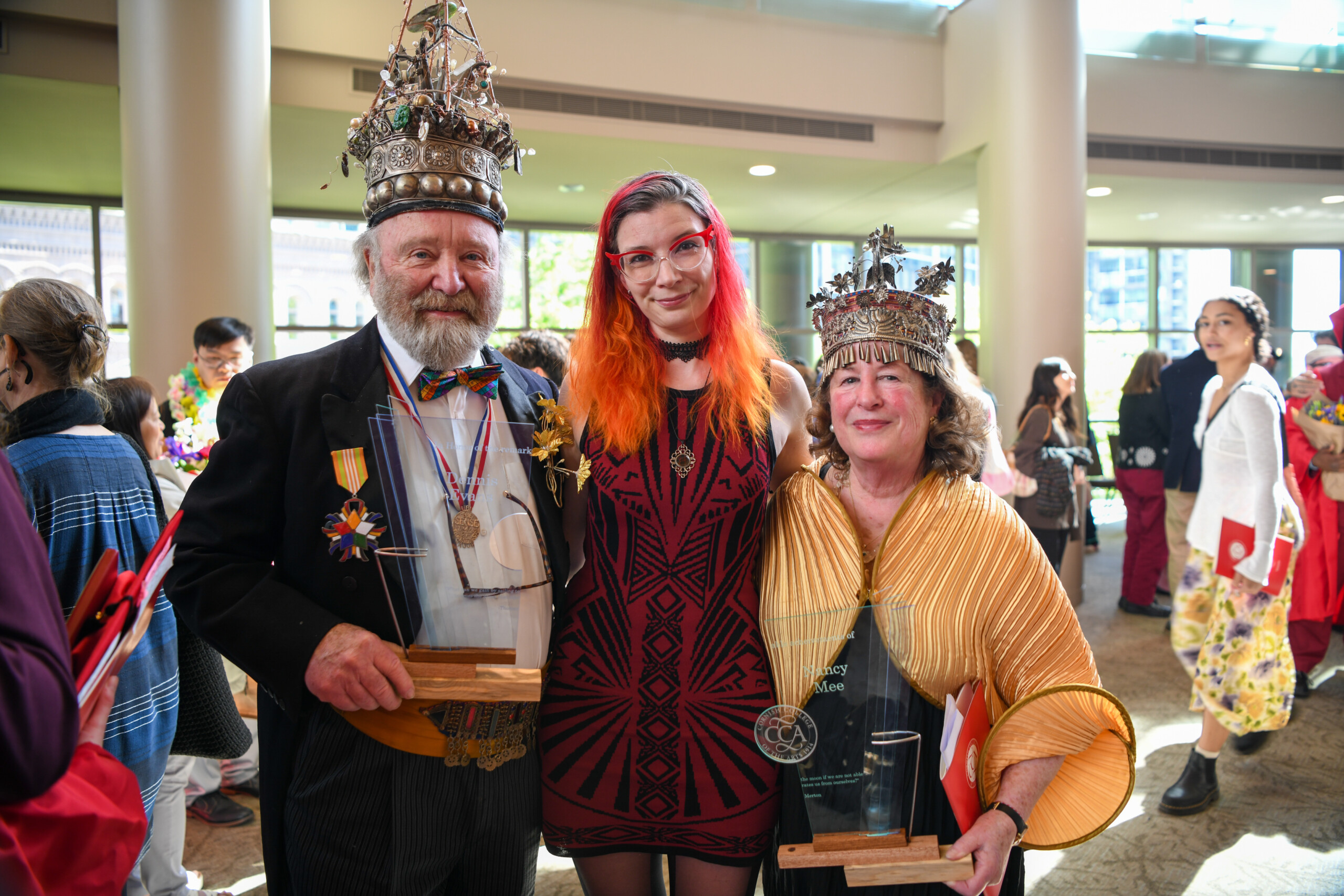Artists Meme Garcia and Lanise Antoine Shelley Discuss ‘Why Shakespeare?’
Earlier this month, the Theater Department welcomed artists Meme Garcia and Lanise Antoine Shelley for a Zoom discussion on “Why Shakespeare?” This panel with visiting artists is one example of the kind of engagement with professional theater majors experience at their time in Cornish Theater. Whether earning a BFA in Acting/Original Works or a BFA in Musical Theater, Cornish theater students benefit from Cornish’s wide-reaching community network of theater artists.
Why Shakespeare?
The discussion, which took place on March 12, was organized by instructor Sarah Harlett. Second-year students submitted questions for the speakers in advance, and Harlett’s teacher’s assistant Lola Fukushima facilitated the discussion. The conversation examined the questions of why Shakespeare is still performed, what it may offer to performers, what work needs to be done to dismantle the text, how casting can affect the experience of Shakespeare, and more.
“This will be the first semester that I’m teaching an intro to Shakespeare module at Cornish,” Harlett said. “It dawned on me that we rarely talk about why we are still studying Shakespeare, why are we still doing these plays, and how do we reckon with these plays, too?”
Take a look below at what Meme Garcia and Lanise Antoine Shelley had to say, you can also view the full recorded discussion on the Panapto pagee (available to Cornish students, faculty, and staff):
Q [Fukushima]: Are Shakepeare’s texts still relevant? How do we continue to make it new and relevant in the ever-progressing 21st century?”
[Garcia]:
I think the most important thing to do is to critique the guy. I feel like people just put him on such a pedestal, and there’s this question on TikTok that I really love, which is ‘are they talented or are they just white?’ And I think that the more people that ask that question about Shakespeare the closer we get to being authentic with him. I find that some of his plays, the majority of his plays, are riddled with misogyny, misogynoir, really intense anti-blackness, and just, we don’t treat him like a contemporary playwright. … I feel like there’s also this idea that you can’t critique him, he’s ‘uncritiqueable.’ I just blatantly disagree with that. I think there is some use in training, it is definitely like when you train with Shakespeare it’s like everything’s in concert, you have the physical body, the mental body, the spiritual, that all kind of have to come together into a character.
[Shelley]:
It’s that concert that I love, that draws me to Shakespeare. As a performer it’s, I believe, the most challenging genre there is because it asks for physical and vocal and emotional muscularity that a lot of contemporary text does not ask of you. But I really think that we should judge texts not by their whiteness, but rather the context, the actual subsistence of the text. So this idea of, and I know we’re in an age of being hyperaware of whiteness in relation to non-white, I try to steer away from ‘I’m going to just omit all of anything that’s white,’ you know. Because I think that’s a dangerous path to go down, and what makes that different from when people omitted everything that was black? And so, if we steer clear of that and defining whether we like Shakespeare or not because of the whiteness inherent in it, I think it’s a safer route to approach just the text, the storytelling itself. … That’s my entry point. With Shakespeare, I love ‘Macbeth.’ I’ve been in three different ‘Macbeths’ and that’s my favorite of the canon, even though I’ve been in other Shakespearian productions. ‘Macbeth’ is the shortest. It has the most linear path, storytelling wise. It’s so juicy. I love the plot itself, it’s palatable and it is approachable in ways that some of the other texts are not. So when it comes to its relevance, we can make it relevant. If it’s in the right hands, it becomes relevant. And you have to think of storytelling in that way, of pivoting your thinking and not ‘Oh, I’m done with this because of this demographic.’ Rather think of it, does this story speak to me? And if it does, how can I enhance it?
[Garcia]:
I think there’s a big fear of being uncomfortable in an American theater, and so there’s like this idea that’s like ‘Oh, we’ll just cancel it. It’s cancelled. We don’t ever have to look at it again.’ And I’m like, oh no, no, no, no, no. This existed for hundreds and hundreds of years in a system of white supremacy, and we have to continue to engage. … I think about the antisemitism in the ‘Merchant of Venice.’ It’s a play that people are like “We’re never going to do again,” and part of me is like, okay, but people are still anti-Semitic today. Shakespeare is anti-Semitic then. There’s a play too that came out of ‘Merchant of Venice’ called ‘Everything that Never Happened’ (a revisionist retelling of ‘Merchant of Venice’ by Sarah B. Mantell) and it’s absolutely stunning and it has to be in conversation with ‘Merchant’ for you to understand.
[Shelley]:
I think it is relevant, it’s relevant in the right artistic hands. Just like any play, may fall flat with the wrong direction of with the wrong casting, and so you have to broaden your way of entry for these classical or contemporary literatures.
[Fukushima]:
I couldn’t agree more, as an actor of color I don’t like the idea of not doing something because it is inherently white. I find that to be frustrating. And if I like the story, the story that it tells or the character that it portrays, then why not be able to dive into this kind of work? But there’s always a block for me, just because, you know, Shakespeare’s text are inherently sexist, racist, and there’s a lot of homophobia, it’s rife with all of these kind of problematic aspects. So how do we approach that? How do we tackle that? You know, we decide for ourselves that we want to continue working with Shakespeare’s texts and everything like that, but then how do we get over that obstacle that like, you know, this language is, inherently just a little bit oppressive.
[Shelley]:
Yeah, it has land mines. I think it’s in the translating of it, it’s in the cutting of it, which people readily do. Rarely do people put a ‘Henry V’ out there just as it is. I don’t know if anyone has ever done that. And so, there’s so much freedom in Shakespeare that people forget about. … Because there are no rights involved, you can do anything. You can do anything to it and get away with it in ways that you can’t with other text. And so, I would say don’t let those landmines deter you, because you could literally take them out.
[Garcia]:
There’s typically never enough support in the room. The idea of a dramaturg could be way expanded to include not only the history of the play, the back story, but also the room that you’re in. Right, if you’re telling these stories. I think Valerie Curtis-Newton calls, instead of marginalized voices, right it’s the ‘global majority’ is what she says, and I think that’s a great way to look at it. You’re working with the global majority in the room right, in dramaturgy, is not just just about the story, the play, the words in the play, but also the story you all are telling in concert, and I think that we haven’t taken enough advantage of dramaturges or even intimacy coordinators and then how all of that has to start, in terms of equity and diversion and inclusion before people even get into the room—or the Zoom room, I guess, now. But there just hasn’t been enough support, I think structurally, to help people navigate these landmines because typically it’s just the director, the actors, who have to do it.
[Shelley]:
You need a team with Shakespeare too, and I think that people, we are in a culture of cutting corners here and there, and one of the reasons why I appreciated being in England and studying over there and studying in Canada, was that they took time with the text. And it actually demands it, it needs a team, a dramaturge, people to really help you just mine the text because every single time you do a Shakespearian play, it’s different. Again, I’ve done the same play numerous times and each time I approach it I’m like ‘wait a minute, I didn’t catch you the first time around.’ And so just like being open to the fact that this is so deep in its richness and in its possibilities and allowing it to unfold at the pace it needs to unfold, because it will slow you down.
View the full discussion here (available for Cornish students, faculty, and staff).

Lanise Antoine Shelley (she/her) is an actress, director, playwright who recently became the artistic director of The House Theatre Chicago. Her first full length play, “Pretended” was developed by Paramount Theatre. She also hosts the podcast “When They Were Young: Amplifying Voices of Adoptees” available on all major platforms including her website. As an actress, she is known for “Chicago Fire,” “Empire,” “Chicago Med,” “Discovery World,” “Macbeth HD” and Goodman Theatre’s live stream of “School Girls: African Mean Girls.” Selected directing credits include “Manakin Blue” (Rising Sun Theatre Company), “Pretended” (Paramount), “Rastus and Hattie,” “Black and Blue,” and movement consultant for “Muthaland” (16th Street Theater), “Hear Me See Me” (Silent Theatre), “The Luck of the Irish” (virtual reading), “Identity Lab” (Lookingglass Theatre), “The Tenant” (Akvavit Theatre), “RefuSHE Project” (Voices & Faces Project), “Rumors” (DePaul University), and a staged reading of “The Convert” (Stratford Shakespeare Festival). She holds a BFA in Directing, Acting and Playwriting from Cornish College of the Arts, an MFA from ART/MXAT at Harvard University, and a certificate in Classical Theatre from both BADA in Oxford, England, and Birmingham Conservatory in Canada. Awards/ Fellowships include Stratford Shakespeare Festival’s Chicago Fellow 2016 and Victory Gardens Theater’s Directing Fellow 2019. More info at: www.laniseantoineshelley.com.
Meme Garcia (they/them) is an actor and playwright originally from El Salvador. They are a Fulbright Scholar and graduated with a MA in Classical Acting from the London Academy of Music and Dramatic Art. They hold degrees in theatre and women and gender and sexuality studies from Seattle University and are currently based out of Ashland, Oregon. For the last two years they have been a member of the Oregon Shakespeare Festival’s resident acting company (“La Comedia of Errors,” and “Bring Down the House parts I&II”). Previously they have worked with upstart crow collective, Seattle Shakespeare Company, Seattle Repertory Theatre, ACT Theatre, Strawberry Workshop Theatre, and Book-It Repertory Theatre. “house of sueños” is their debut play, and they are currently working on a coming of age TV show called “Las Siguanabas.” More info at: memerosagarcia.com.



